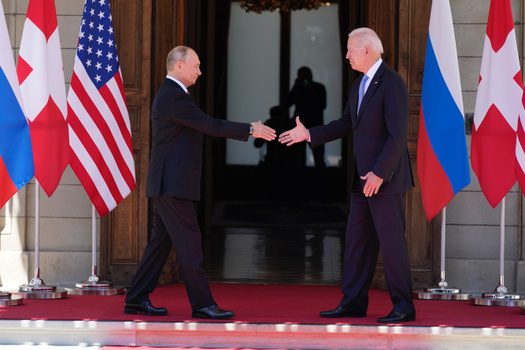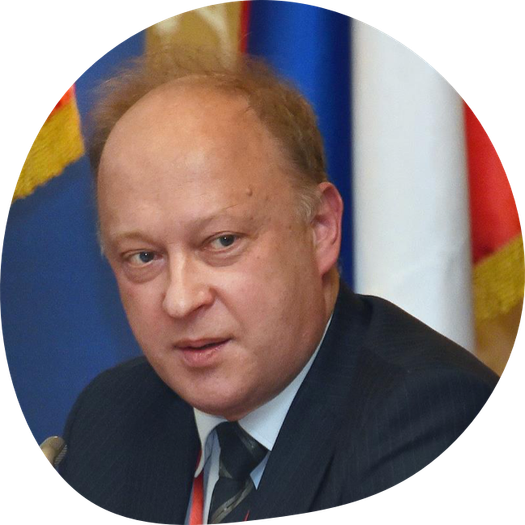
What it all meant Experts explain the significance, or lack thereof, of last week’s Putin-Biden summit
Мы рассказываем честно не только про войну. Скачайте приложение.
Joe Biden and Vladimir Putin have finally met, face to face, for the first time as presidents. The brief summit took place in Geneva on June 16 before each leader addressed reporters in separate press conferences. Putin told journalists that his conversation with Biden was “constructive,” though he complained about violence on U.S. streets (“You can barely say a word there before you are shot in the face or in the back”) and claimed that Alexey Navalny engineered his own arrest (“He did what he wanted to do”). The American president, meanwhile, said he seeks a “stable and predictable” relationship with Russia. He also warned that Russia’s international reputation would suffer “devastating” damage if Navalny dies in prison. Meduza asked several experts to identify what they think are the summit’s most important results and why.

Sergey Radchenko
Professor of international relations at Cardiff University
There were no surprises at the meeting. I’d suspected that Putin needed the summit most of all to promote himself on the world stage and to present himself as a statesman recognized by the American president — someone with whom the White House is ready to enter into a dialogue about important strategic issues and global security. And this is what Putin achieved. He held a press conference where he lied about some things and left other things unsaid, but he loves this stuff and he’s well prepared for it. Concerning his image, he performed well.
The meeting was important primarily for what it signaled to domestic audiences in Russia and the United States. First and foremost, Putin is focused on bolstering his image as a world leader, which has deteriorated somewhat since 2013. Russia hasn’t been isolated completely, but there’s been a setback in relations with the West. From this point of view, the summit worked for Putin.
On the American side, it’s a bit puzzling. I don’t entirely understand why Biden needed this summit. It’s clear that Putin would use it to legitimize his own leadership in Russia, especially at a time when he’s persecuting the opposition and Navalny is in prison. Looking at this from the U.S., there are two perspectives. First, Biden wanted to show his Western partners that he’s a true leader who’s capable of straight talk with Putin. Second, Biden needs to stabilize relations with Russia so he can go all-in on China, which is priority number one for him.
Maybe all these factors played a decisive role, but it can be said without exaggeration, based on the summit’s results, that Putin scored a win for his image. He appeared on the international stage, and the entire world’s eyes were fixed on him for a day. This was all extremely helpful to him. He emerged as a world leader. I think that’s the most important takeaway from this summit.
The summit’s actual results are nothing to write home about. They adopted a three-paragraph statement on strategic stability where Putin and Biden echoed the words of Reagan and Gorbachev in 1985 about the impossibility of winning a nuclear war, which is why one can never be started. This is no diplomatic triumph. And the fact that Biden and Putin announced that they don’t want to attack each other and destroy the world — well, thank God for that. But if this was the whole point of this summit, it isn’t much.
It’s also noteworthy that Russia and the U.S. agreed to return their ambassadors, which will facilitate the normalization of relations at a low level. But it was Russia, in fact, that recalled its ambassador in the first place and then kicked out his American counterpart. Now Putin has waved his hand and said, “Okay, come on back.” In other words, we can call the ambassadors’ return a result of some kind, but it’s overshadowed by Putin and the effect of his legitimization for Russia’s domestic audience.
Putin’s comments about Navalny were nonsense. It was pretty obscene, given that everyone knows what happened. Here, as well, he catered to his domestic audience, which is less dismissive of this narrative. But who else would buy this? Everyone knows what happened, why Navalny left the country, and in what condition he left. Yet Putin sticks to a story that doesn’t hold up under the slightest criticism. He’s saying what he wants and he’s just trolling the international community. And all the journalists at the conference sat there listening, looking back blankly.
I don’t see anything good in future U.S.-Russian relations in the coming months and years. If we compare this meeting with the Geneva 1985 [U.S.-Soviet] summit, there was also a tense relationship then, but the situation was different. On the one hand, there was Reagan, and on the other hand, there was Gorbachev, who genuinely wanted better relations. With Putin, it’s unclear what he wants. His agenda remains largely incomprehensible. It’s based on the notion that the West is receding as an important force in the world. He’s dropped the subject of the West — it doesn’t interest him. Considering all this, it’s hard to expect any breakthroughs.
After this meeting, however, Europe will strive for a better relationship with Russia. Before, when [French President Emmanuel] Macron met with Putin, it was viewed as an extraordinary event. But now Biden has opened the door for this. Since Biden meets with him, it means Putin isn’t the worst kid on the block, and it’s okay to do business with him. You can now expect warming, improved relations between Russia and a number of Western European states.

Andrey Kortunov
Russian International Affairs Council director-general
This was Putin and Biden’s first meeting, hastily prepared. There could be no question of signing serious, substantive documents. Their task was effectively to give the military, diplomats, and others the go-ahead to start working on specific issues — primarily on strategic stability and weapons control. And they achieved this.
Biden isn’t Trump. He’s more predictable, he’s a team player. But that doesn’t mean there were no surprises. The most interesting moment was when they seemed to make an agreement to cooperate on cybersecurity. If this actually happens and Biden doesn’t pull out when he returns home, then this is a major shift in the American position. Because the American position has been something like this: “What is there to talk about with you guys? You need to stop your hooligan-like attacks on our basic infrastructure, and then the problem will be solved.”
If the U.S. agrees to operate on the level of a joint task force and consider the problem from both sides, then this is a positive shift. But there are a lot of different possibilities. We need to wait a few more weeks, and then the picture will become clear.
Usually, the person who proposes the summit is the one who needs it more. This one was at America’s initiative, but it seems to me that both sides had an interest. After all, Putin could also have taken a stand and said, “If you’re going to call me a murderer, I’m not going to meet with you.” And he didn’t do that, which means he needed this too.
In discussing Navalny and the opposition, Putin drew a red line. Maybe the most significant one. He essentially said, “You and I can discuss any topic, but keep out of our domestic politics — you don’t have the moral authority or any other kind of authority, because you yourself have plenty of domestic problems. We’ll deal with our revolutionaries ourselves.”
So that conversation isn’t going to happen. Sure, Biden will keep insisting on human rights, but he won’t be firm about it; conversations with him are much less harsh than those with his European partners because it’s not the main thing on his list of priorities.

Ivan Kurilla
Professor at the European University at St. Petersburg
The U.S. and Russia want more predictability. They want to reestablish a normal dialogue. “Normal” doesn’t mean solving all of their problems, but it does mean more predictability. Normality is predictability — it’s the feeling that no part of the relationship is going to explode tomorrow, and that we’re not going to start a war.
Little by little, this normality has been shifting. The fact that Biden met with Putin doesn’t mean things are returning to the past. We’re not going back to 2007 or to 2012; everything is at a much lower level right now. On the other hand, the day before the [American presidential] election, a number of American experts said that the countries’ relationship was more predictable during the Cold War than it is now. In that sense, the Cold War was preferable to the current situation. But I don’t know if it’s the norm.
But it is true that more regular meetings will be necessary to preserve predictability. And if the leaders make promises, they need to act on them; otherwise, what was the summit for? If relations start deteriorating again soon, this issue will arise.
I expected Biden to lecture Putin about human rights, and that they would make an agreement about something. Biden really did express all his concerns — from Navalny to press freedom — but Putin, predictably, dismissed that part of the conversation. At the press conference, he once again started explaining that everyone who’s against him or who criticizes him is an American agent. This is a position he’s had for a long time, and he reiterated it at the press conference.
For Biden, it seems to me, this was all a ritual. He outlined the human rights problem. He said he would keep an eye on it. He basically gave Putin a warning — and stopped there.
More productive was their conversation about international issues. By all indications, they made some kind of agreement about Afghanistan and Iran. They made an agreement on cybersecurity. Or perhaps didn’t make an agreement, but indicated their willingness to negotiate. Biden said there’s now a six-month deadline in place. We’ll see what happens over the next six months, and to what degree Russia fulfills its promises. Six months from now will be the checkpoint, and then we can raise questions.
The main result both leaders underlined was a return to normalcy: they’re sending back their ambassadors and restoring diplomatic relations. This was the least we could have hoped for, and they did it. Neither Biden nor Putin needs an open confrontation with the other.
Biden doesn’t trust Putin, of course. He repeated multiple times that Putin has tarnished Russia’s reputation and that he’s personally at fault for it. But that doesn’t mean it’s not necessary to talk to him. The implication was that the U.S. has an interest in leading stable relations with Russia — and in ensuring that Russia doesn’t interfere in American domestic politics, cybersecurity, or elections. That’s the minimum.
Analysts will claim that Putin benefitted from the summit because he needed the meeting; in reality, though, Biden needed it, too. He got what he wanted. It’s clear he didn’t care so much about influencing Russia’s internal politics. As he said at the end [of the press conference], his job is to protect American interests, and right before that, he mentioned human rights. In my view, that means that if Navalny dies in prison, there will be consequences, but if he remains in prison alive, that’s not really a problem. That isn’t the level of pressure that human rights activists and hardliners against Putin expected. But the pragmatists are satisfied.
We’re witnessing a historical phenomenon in which any improvement to Russian-American relations leads to relaxation inside of Russia. Putin’s logic is that the U.S. declared Russia its enemy and announced its support for democratic organizations within Russia. In other words, according to his logic, those who oppose his regime. But this logic can be flipped. If the U.S. doesn’t declare Russia its enemy, it means there’s no reason to apply pressure to Russia’s domestic opposition. Or that there are reasons, of course, according to his logic, but fewer of them.

Precious N Chatterje-Doody
Lecturer in politics and international studies
The most noticeable feature of the Biden-Putin summit was how unremarkable most of it was. After the dramatic highs and lows of recent US-Russian relations, this summit – and the post-summit press conferences – looked a lot like “business as usual.” Both leaders’ post-summit remarks emphasized the business-like nature of the meetings: neither hostile, nor friendly, but pragmatic. Standard protocol was followed, with talks being observed and recorded – unlike the infamous Trump-Putin Helsinki meeting. Post-summit discussions are again focused on determining who is the diplomatic winner or loser - and not around specific scandals or gaffes – so it is clear that some of the normalization sought has been formally achieved.
The summit also offered a familiar opportunity for the two leaders to package their international relations for wider audiences. President Putin has long used military involvements to boost Russia’s diplomatic bargaining power (think Syria); using the increased international bargaining power that this generates to garner domestic support. This summit — which came about after Russia’s military build-up around Ukraine — gave him ample opportunities to re-iterate Russia’s role as a global great power, of a rank with the U.S., jointly bearing “special responsibility for global strategic stability.”
For Biden, the summit offered an opportunity to continue re-branding the U.S. — under his leadership as a consummate professional — as an active player on the world stage. His presser reflected this, with a dose of nation-building alongside political pragmatism. He positioned human rights as fundamental to American political identity. Yet here he rather tamely referred to concerns raised with Putin. Explicit commitments appeared absent, except in the case of “attempts to violate our democratic sovereignty or destabilize our democratic elections,” which “we will not tolerate” and to which “we would respond.”
In a practical sense, the summit resulted in commitments to bilateral consultations on arms control and cybersecurity as well as the agreement that the states’ respective Ambassadors — both recently recalled — will return to their posts. These all indicate at least a formal normalization of relations, aimed at increased predictability based on mutual interests and delimited common goals, rather than any comprehensive re-calibration.
Yet the two sides nonetheless put a different spin even on these joint commitments. Biden emphasized a return to professional politics, both for domestic audiences and the wider international community. He repeatedly stated that he had gone into the meeting intending to pursue dialogue mechanisms that would increase strategic stability, and that these objectives were well represented in the meeting outcomes.
Putin’s take was calibrated for Russian domestic audiences. U.S. concerns about Ukraine, cyber interference, and human rights violations were deflected with counter-allegations: Ukraine suffered a “bloody coup”; the US commits more nefarious cyber activity than Russia; and it imprisoned the Capitol protesters. Given the strength and confidence of international opinion about such issues, it’s clear that the intended audience for these comments was domestic. It fits the pattern with which Putin’s leadership has stoked and drawn strength from anti-Western factions in recent years. For international audiences, Putin applied the playbook familiar from Russia’s international broadcaster, RT: he flagged up the poor U.S. record on police shootings, drone strikes on civilians, and Guantanamo Bay.
Formal normalization and greater strategic predictability are largely beneficial to both parties. Nonetheless, Putin’s reliance domestically on friction internationally could limit the appetite for, and political expediency of, further meaningful cooperation with the United States. Ultimately, the practical impact of these discussions will only be known with time. As Biden himself remarked, “we’ll find out within the next six months to a year whether or not we actually have a strategic dialogue that matters.”

Maria Shagina
Postdoctoral fellow at the Center for Eastern European Studies at the University of Zurich and a member of the Geneva International Sanctions Network at the Graduate Institute
It was clear from the beginning that the Biden-Putin summit will not result in a breakthrough. While there were many topics to discuss, there was very little to agree on. The personal meeting aimed to stabilize the relationship where possible and attempted to lay the groundwork for “a stable and predictable relationship.” After the chaotic Trump presidency, both the U.S. and Russia are interested in increasing predictability and minimizing uncontrolled confrontation.
The talks exceeded low expectations. Ukraine and Belarus expectedly remained the most difficult topics to find a common ground on, however, several areas were outlined where mutual interests in achieving strategic stability exist: return of the country’s respective ambassadors, arms control, cybersecurity, and prisoners’ exchange. The most notable advancement occurred in cybersecurity. The U.S. attempted to set red lines in cyberspace and carve out safe zones in 16 areas of critical infrastructure.
Biden acted in good faith in negotiating with Russia while setting clear boundaries. The next 6-12 months will be decisive in determining whether Russia is genuinely interested in establishing a new equilibrium.
Interviews by Alexandra Sivtsova and Kevin Rothrock
Translations by Sam Breazeale and Kevin Rothrock